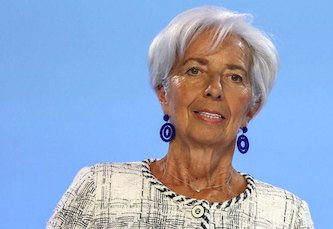By Mark McSherry
The European Central Bank (ECB) raised euro zone borrowing costs to their highest level in 22 years on Thursday, with ECB President Christine Lagarde saying that a further rate hike in July is “very likely.”
The quarter percentage point move was the ECB’s eighth consecutive interest rate hike — and took its policy rate to 3.5%, a level not seen since 2001.
Analysts said continued high inflation all but guarantees another interest rate hike next month — and probably more hikes beyond that as well.
ECB officials also confirmed a halt in reinvestments under their €3.2 trillion Asset Purchase Program from next month.
“Barring a material change to our baseline, it is very likely the case that we will continue to increase rates in July,” ECB President Christine Lagarde told a press conference.
“Are we done? Have we finished the journey? No. We’re not at our destination. Do we still have ground to cover? Yes, we still have ground to cover,” she said.
Lagarde again warned about wage rises and companies pushing up inflation.
“Wage pressures, while partly reflecting one-off payments, are becoming an increasingly important source of inflation,” she said.
“Moreover, some sectors have been able to keep profits relatively high.”
Lagarde added: “The Governing Council’s past rate increases are being transmitted forcefully to financing conditions and are gradually having an impact across the economy …
“We are not thinking about pausing, as you can tell.”
The ECB said in its statement: “According to the June macroeconomic projections, Eurosystem staff expect headline inflation to average 5.4% in 2023, 3.0% in 2024 and 2.2% in 2025. Indicators of underlying price pressures remain strong, although some show tentative signs of softening.
“Staff have revised up their projections for inflation excluding energy and food, especially for this year and next year, owing to past upward surprises and the implications of the robust labour market for the speed of disinflation.
“They now see it reaching 5.1% in 2023, before it declines to 3.0% in 2024 and 2.3% in 2025. Staff have slightly lowered their economic growth projections for this year and next year. They now expect the economy to grow by 0.9% in 2023, 1.5% in 2024 and 1.6% in 2025 …”
